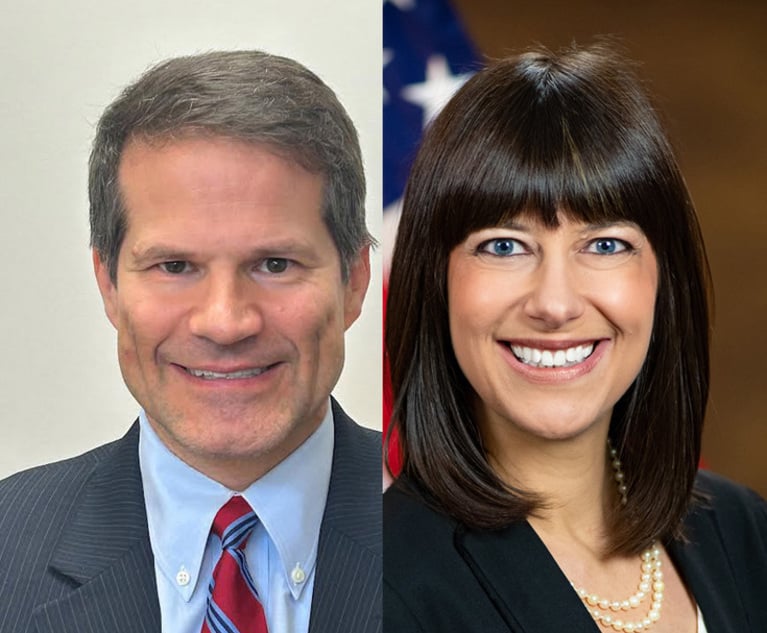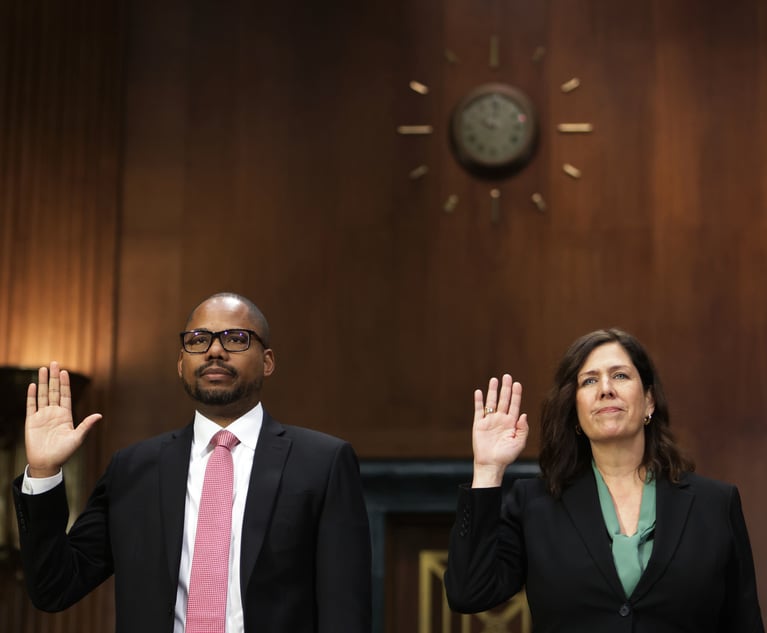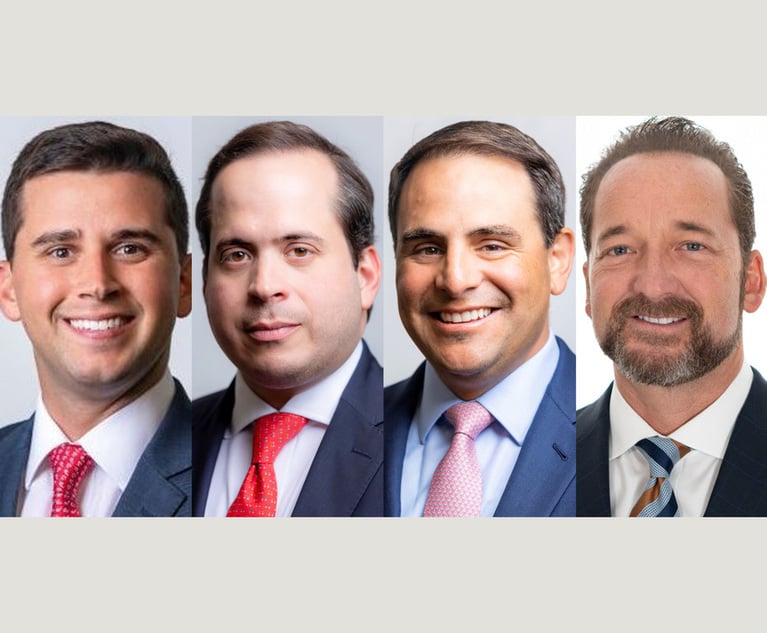 Senator Lindsey Graham (R-SC), speaks to members of the press before the start of a Senate Judiciary Committee hearing titled "Encryption and Lawful Access: Evaluating Benefits and Risks to Public Safety and Privacy," on Tuesday, December 10, 2019. Photo: Diego M. Radzinschi/ALM
Senator Lindsey Graham (R-SC), speaks to members of the press before the start of a Senate Judiciary Committee hearing titled "Encryption and Lawful Access: Evaluating Benefits and Risks to Public Safety and Privacy," on Tuesday, December 10, 2019. Photo: Diego M. Radzinschi/ALM AP Explainer: What's the 'Speech or Debate' Clause Cited in Georgia Probe?
Sen. Lindsey Graham is holding up the Constitution's "speech or debate" clause as a shield as he tries to avoid testifying before a special grand…
August 22, 2022 at 04:32 PM
6 minute read
Federal GovernmentSen. Lindsey Graham is holding up the Constitution's "speech or debate" clause as a shield as he tries to avoid testifying before a special grand jury that's investigating whether former President Donald Trump and others tried to illegally influence the 2020 election in Georgia.
Fulton County District Attorney Fani Willis wants to ask the South Carolina Republican about two phone calls she says he made to Georgia Secretary of State Brad Raffensperger and his staff in the weeks after the 2020 general election, as well as the circumstances and logistics surrounding those calls. Raffensperger said at the time that Graham asked him whether he had the power to reject certain absentee ballots, a question he interpreted as a suggestion to toss out legally cast votes.
Graham's attorneys have argued that the calls were made as part of his legislative duties and that the speech or debate clause gives him absolute protection from having to testify.
The legal back-and-forth has already delayed Graham's testimony, which had been been set for Tuesday.
WHAT EXACTLY IS THE SPEECH OR DEBATE CLAUSE?
Under Article I of the Constitution, "for any Speech or Debate in either House," senators and U.S. House members "shall not be questioned in any other place." Simply, the provision — "approved at the Constitutional Convention without discussion and without opposition," the U.S. Supreme Court wrote in a 1966 decision — is intended to protect members of Congress from questioning about official legislative acts.
In a 1968 decision concerning a congressman's conviction under a conflict of interest statute, the Supreme Court wrote that the provision's intent was "to prevent legislative intimidation by and accountability to the other branches of government."
WHAT DOES IT PROTECT?
The argument over whether Graham is protected by the clause in this case "is fundamentally about what kinds of acts are legislative versus what kinds of acts are not," said Anthony Michael Kreis, a constitutional law professor at Georgia State University.
Actions like speaking on the floor of the House or Senate, introducing legislation, working on a committee report and acts of legislative fact finding are all clearly covered, he said. News interviews, publications unrelated to official duties, political activities and engaging with the executive branch are not covered, he said.
WHAT ARE GRAHAM'S ARGUMENTS?
Graham has argued that the calls to Raffensperger involved his duties as a U.S. senator and chairman of the Senate Judiciary Committee, so he should have absolute protection from having to testify in this case. In court earlier this month, Graham attorney Brian Lea argued that the senator's responsibility to decide whether to vote to certify Georgia's election results, coupled with his shepherding of election-related legislation, made the calls part of his legislative duties.
WHAT HAS WILLIS' TEAM ARGUED?
Prosecutors have argued that the calls are just their starting point. They have also disputed the notion that the phone calls were solely about legislative issues, saying that Graham was seeking to make changes to the way Georgia handled absentee ballots ahead of January 2021 runoff elections for U.S. Senate.
WHAT DID THE JUDGE OVERSEEING GRAHAM'S CASE SAY?
Graham asked U.S. District Judge Leigh Martin May to quash his subpoena and rule that he didn't have to testify before the special grand jury. Last week, she declined to do that, meaning Graham was still set to appear on Tuesday.
May noted that the clause doesn't protect actions that are political rather than legislative. Even if she accepted that the calls were "comprised entirely of legislative factfinding," and thus protected, "there would still be significant areas of potential testimony related to the grand jury's investigation on which Senator Graham could be questioned that would in no way fall within the Clause's protections," she wrote.
SO WHAT'S HAPPENING NOW?
Graham appealed to the 11th U.S. Circuit Court of Appeals. A three-judge panel of the appeals court on Sunday issued an order temporarily putting on hold May's order rejecting Graham's request to quash the subpoena. That also put his Tuesday appearance before the special grand jury temporarily on hold.
The appeals court sent the case back to May, instructing her to determine whether Graham "is entitled to a partial quashal or modification of the subpoena" based on the Constitution's speech or debate clause.
May on Monday ordered the two sides to file briefs, with the final deadline at the middle of next week. She specifically asked them to "address whether, and to what extent, certain alleged conduct (including specific lines of inquiry on telephone calls) is shielded from questioning" by the clause.
And she asked them to discuss whether "informal investigative inquiries" by members of Congress are protected by the clause or whether it applies only to "investigative inquiries that originate from a more formal congressional source, such as an investigation authorized by a Senate subcommittee."
THEN WHAT?
It's hard to say. If she finds that Graham is not entitled to any protection from the speech or debate clause for this matter, she could rule that any questions that Willis' team wants to ask are fair game, professor Kreis said. But if she finds that certain lines of questioning would infringe on his privilege under the clause, she could set "narrow guideposts," he said.
Once May has ruled on this limited issue, the case will head back to the 11th Circuit for further consideration.
HAVE ANY OTHER POTENTIAL WITNESSES MADE SIMILAR ARGUMENTS?
Yes. U.S. Rep. Jody Hice, a Georgia Republican and Trump ally, also filed a motion in federal court seeking to quash his subpoena. His case was also heard by Judge May. During a hearing, Hice's lawyers agreed that there were some questions he could be asked before the special grand jury that wouldn't be protected by any immunity.
May sent the case back to Fulton County Superior Court. She said at the time that if disagreements were to arise over whether specific questions infringed on Hice's federal immunities, he could bring the federal issues back to her to settle. It wasn't immediately clear where that stands.
NOT FOR REPRINT
© 2024 ALM Global, LLC, All Rights Reserved. Request academic re-use from www.copyright.com. All other uses, submit a request to [email protected]. For more information visit Asset & Logo Licensing.
You Might Like
View All

Trump's Solicitor General Expected to 'Flip' Prelogar's Positions at Supreme Court

'Radical Left Judges'?: Trump Demands GOP Unity Against Biden's Judicial Picks
4 minute read
Trump's Lawyers Speak Out: 'The President Had the Confidence to Retain Me'
Trending Stories
Who Got The Work
Michael G. Bongiorno, Andrew Scott Dulberg and Elizabeth E. Driscoll from Wilmer Cutler Pickering Hale and Dorr have stepped in to represent Symbotic Inc., an A.I.-enabled technology platform that focuses on increasing supply chain efficiency, and other defendants in a pending shareholder derivative lawsuit. The case, filed Oct. 2 in Massachusetts District Court by the Brown Law Firm on behalf of Stephen Austen, accuses certain officers and directors of misleading investors in regard to Symbotic's potential for margin growth by failing to disclose that the company was not equipped to timely deploy its systems or manage expenses through project delays. The case, assigned to U.S. District Judge Nathaniel M. Gorton, is 1:24-cv-12522, Austen v. Cohen et al.
Who Got The Work
Edmund Polubinski and Marie Killmond of Davis Polk & Wardwell have entered appearances for data platform software development company MongoDB and other defendants in a pending shareholder derivative lawsuit. The action, filed Oct. 7 in New York Southern District Court by the Brown Law Firm, accuses the company's directors and/or officers of falsely expressing confidence in the company’s restructuring of its sales incentive plan and downplaying the severity of decreases in its upfront commitments. The case is 1:24-cv-07594, Roy v. Ittycheria et al.
Who Got The Work
Amy O. Bruchs and Kurt F. Ellison of Michael Best & Friedrich have entered appearances for Epic Systems Corp. in a pending employment discrimination lawsuit. The suit was filed Sept. 7 in Wisconsin Western District Court by Levine Eisberner LLC and Siri & Glimstad on behalf of a project manager who claims that he was wrongfully terminated after applying for a religious exemption to the defendant's COVID-19 vaccine mandate. The case, assigned to U.S. Magistrate Judge Anita Marie Boor, is 3:24-cv-00630, Secker, Nathan v. Epic Systems Corporation.
Who Got The Work
David X. Sullivan, Thomas J. Finn and Gregory A. Hall from McCarter & English have entered appearances for Sunrun Installation Services in a pending civil rights lawsuit. The complaint was filed Sept. 4 in Connecticut District Court by attorney Robert M. Berke on behalf of former employee George Edward Steins, who was arrested and charged with employing an unregistered home improvement salesperson. The complaint alleges that had Sunrun informed the Connecticut Department of Consumer Protection that the plaintiff's employment had ended in 2017 and that he no longer held Sunrun's home improvement contractor license, he would not have been hit with charges, which were dismissed in May 2024. The case, assigned to U.S. District Judge Jeffrey A. Meyer, is 3:24-cv-01423, Steins v. Sunrun, Inc. et al.
Who Got The Work
Greenberg Traurig shareholder Joshua L. Raskin has entered an appearance for boohoo.com UK Ltd. in a pending patent infringement lawsuit. The suit, filed Sept. 3 in Texas Eastern District Court by Rozier Hardt McDonough on behalf of Alto Dynamics, asserts five patents related to an online shopping platform. The case, assigned to U.S. District Judge Rodney Gilstrap, is 2:24-cv-00719, Alto Dynamics, LLC v. boohoo.com UK Limited.
Featured Firms
Law Offices of Gary Martin Hays & Associates, P.C.
(470) 294-1674
Law Offices of Mark E. Salomone
(857) 444-6468
Smith & Hassler
(713) 739-1250






